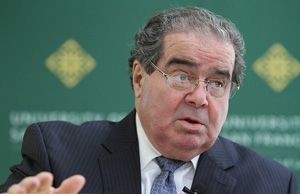Scalia illustrates the art of judicial persuasion
By Laura Ernde
Staff Writer
What kinds of things do appellate lawyers do to get under the skin
of U.S. Supreme Court Justice Antonin Scalia? Plenty, judging from his Jan. 31
talk at the University of San Francisco School of Law.
 |
Photo by Shawn Calhoun, USF
|
Scalia ticked off a number of annoyances: waving your eyeglasses
around for effect (“childish”), reading from your briefs (“Not in my court!”)
and overstating the facts (“I’m inclined to think you’re a blowhard”).
Along the way, Scalia and Bryan A. Garner — the lawyer and
lexicographer he collaborated with on two books about legal writing — offered
some valuable tips for lawyers on ways to improve their legal writing and oral
advocacy skills during their keynote speech for the USF Law Review Symposium,
“Legal Ethics in the 21st Century: Technology, Speech and Money.”
“Our ethical duty hinges on the ability to speak and write
truthfully and well,” said Elif Sonmez, a third-year law student at USF who is
the Law Review Symposium Editor.
Scalia and Garner based their talk on the first book they wrote
together in 2008, “Making Your Case: The Art of Persuading Judges.”
Here are some bits of advice they shared:
- Know
your audience. “Find out everything you can about the judge you’re arguing about,”
Scalia said.
- Learn
the case inside and outside the record. Write down a thousand questions about
the case.
- Lead
with your best argument. Contrary to the great philosopher Aristotle, who
advised starting with your second-strongest argument and ending with the
strongest, a different approach is necessary for legal brief writing because a
judge might not read to the end.
- Be
willing to concede points that aren’t essential to your case. Identify those
points ahead of time so you can answer any hypothetical question posed during
oral argument.
- Identify
your best points and stick to them. “Lawyers don’t win on those buckshot
arguments,” Scalia said.
- Terminology
matters. Don’t use acronyms and give some thought to what names you use.
American Airlines lawyers shouldn’t refer to their company as “double A” or
“the carrier” when they could call themselves “American.” “Let the other side
be anti-American,” Garner said.
- Practice
improves public speaking and reading good writers improves writing.
- Treasure
simplicity. “Don’t make a simple case complex. Make a complex case simple,”
Scalia said. “Be Joe DiMaggio.”
Scalia and Garner agreed that while the basic principles of ethics
and effective advocacy have remained fairly constant, technology has made
things more complicated.
“The modern lawyer confronts a lot more ethical questions than
used to be the case,” Scalia said.